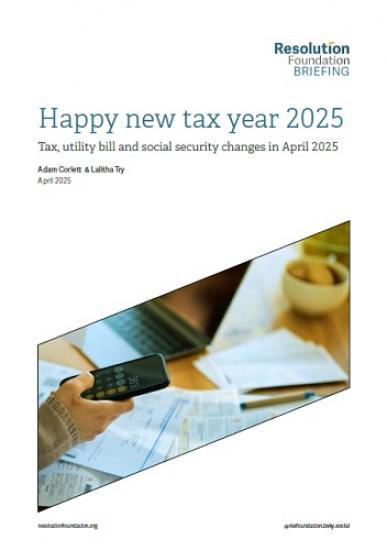Happy new tax year 2025 - Tax, utility bill and social security changes in April 2025
6th April 2025

Adam Corlett and Lalitha Try from the Resolution Foundation look at what the new tax year brings.
April brings with it a series of tax, benefit and bill rises. In this note - the fourth in an annual series - we examine what these changes will mean for households and the overall outlook for disposable incomes in 2025-26.
The combined impact of this year's freezing of personal tax thresholds and the increase in employer National Insurance is an estimated income loss in 2025-26 of around £170 for a typical household relative to an all-else-equal world of no tax rises.
The rise in Council Tax will result in an income fall for the typical household of £80 a year in cash terms - with increases of 5 per cent across most of England, similar in Northern Ireland, 7 per cent in Wales and 9 per cent in Scotland. This is part of an ongoing trend of Council Tax rising faster than inflation, which has taken this revenue to its highest ever share of GDP outside of the pandemic.
Energy prices have fallen a long way from their peak, but April 2025 sees a rise in the annualised energy price cap of £111 - the first time that energy prices are pushing up inflation since Q3 2023.
For most households in England and Wales, this year's biggest bills surprise will come from their water company, where households will see an average rise of 26 per cent, or around £120 a year (and as high as 47 per cent for Southern Water customers).
Most non-pensioner benefits will rise by just 1.7 per cent (adding £80 a year to basic single adult support), considerably less than expected inflation in 2025-26 of 3.2 per cent - meaning that the real value of this social security income will fall this year.
What's more, Local Housing Allowance will remain frozen, whereas a continued link to rents would have meant a typical 9 per cent boost (or an average of around £800 a year for two-bedroom properties).
Altogether, incorporating the broader outlook for inflation, earnings and housing costs, the real median non-pensioner household income is projected to fall by 1 per cent (or around £400) in 2025-26, while the income of the poorer half may fall by 2 per cent. This pessimistic outlook - after a likely strong year for incomes in 2024-25 - is reinforced by illustrative case studies.
Read more details n the full Resolution Foundation report HERE
Pdf 17 Pages
